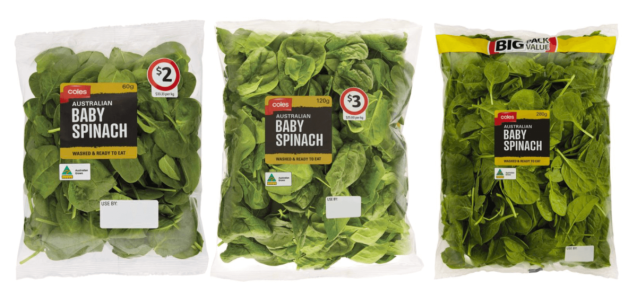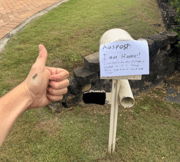Spinach surprise: You won't believe what this shopper found in a bag of fresh greens!
- Replies 20
Grocery shopping - it's a love-hate relationship. On one hand, it can be an exciting adventure through aisles of colourful produce and endless options. On the other, it's a battle against time, budget, and crowds.
Thankfully, though, there is always the option of online shopping, which allows us to shop for our essentials from the comfort of our homes!
No more fighting for parking spots, no more dragging around a heavy basket, and no more waiting in line at the checkout. Online grocery shopping has changed the game and we're all reaping the benefits.
But, as with anything, there are always a few bumps in the road. Take Louise, a resident of Wanneroo, who recently had a shocker of a story while trying to whip up a healthy salad for dinner.
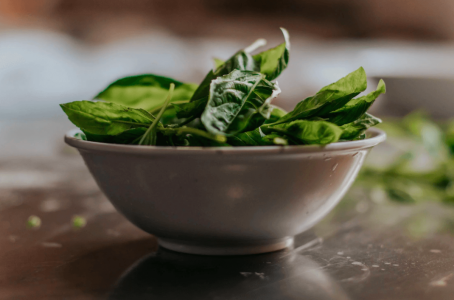
Louise recently bought a pre-packaged bag of baby spinach, which said 'washed and ready to eat' on the label, from her local Coles supermarket.
However, when she went to grab the greens from her fridge, she realised her salad was going to have a bit of an extra (and rather unwelcome) ingredient in the mix. Hidden among the greens was a dead mouse.
Trodden on and disfigured but unmistakably recognisable (and definitely not part of the advertised ingredients), Louise was immediately (and understandably) grossed out.
'In my mind, I thought I must’ve got one of those mixed leaf lettuce bags with the purple lettuce because it had a little bit of odd colouring,' she said.
'Then I looked closer and saw it had feet and a tail.'
The incident, of course, forced Louise to take the packet back to Coles in person and request a refund – and given the shock of her experience, we don't blame her in the slightest!
At the time of writing, the mouse incident is still being investigated by Coles and the City of Wanneroo, with Louise's complaint believed to have been referred to the Department of Health in Victoria (as the bag of spinach was reportedly packaged there).
It's a horrible thing to have happened, and we can understand Louise's sentiment that it has definitely put her off pre-packaged food.
Members, take this story as a warning sign to always check over your fruit, veg, and other pre-packed items before you use them; it's better to be safe than sorry!
Pre-cut fruit and vegetables are a convenient and popular option for many people, but aside from unwelcome ingredients added to the mix, pre-packaged fruit and vegetables can pose several health risks, such as:
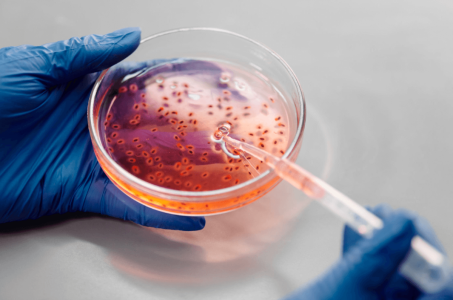
Bacterial contamination
The moist environment created by the cut fruit and vegetables provides a suitable environment for the growth of harmful bacteria such as Salmonella, Listeria, and E. coli.
These bacteria can cause foodborne illnesses, which can range from mild symptoms such as nausea and diarrhoea to more severe illnesses such as meningitis and even death, particularly in vulnerable populations such as young children, the elderly, and people with weakened immune systems.
To minimise the risk of foodborne illness from pre-cut fruit and vegetables, it's important to take several steps. This includes storing pre-cut fruit and vegetables at the appropriate temperature, avoiding cross-contamination by washing your hands before handling food and using clean cutting boards, and properly storing and using the fruit and vegetables within their recommended shelf life.
It's also important to be mindful of any signs of spoilage or contamination and to discard any fruit and vegetables that look or smell off.
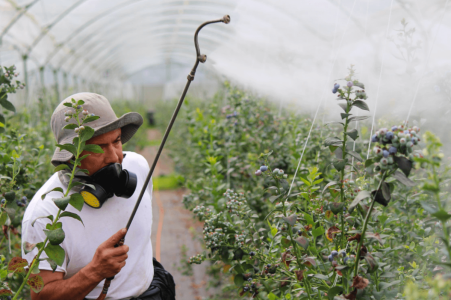
Chemical residue
Pesticides and other chemicals are commonly used in agriculture to protect crops from insects, diseases, and other pests. While these chemicals are necessary to ensure that fruit and vegetables are safe to consume, they can also linger on the produce even after it is harvested, washed, and packaged.
When these pre-packaged fruit and vegetables are consumed, the chemicals can enter the body and over time, their cumulative effects can be harmful to our health.
Studies have shown that exposure to certain pesticides has been linked to a range of health problems, including cancer, developmental problems, and neurological damage. These health risks can be particularly pronounced for children, who are still developing and therefore more vulnerable to the effects of chemical exposure.
To minimise exposure to pesticides and other chemicals in pre-packaged fruit and vegetables, it is recommended to buy organic produce whenever possible.
And don't forget, giving your fruits and veggies a good wash and even peeling them, if possible, can help get rid of any yucky chemicals hanging around on the surface. Want to know how? Check out this helpful article!
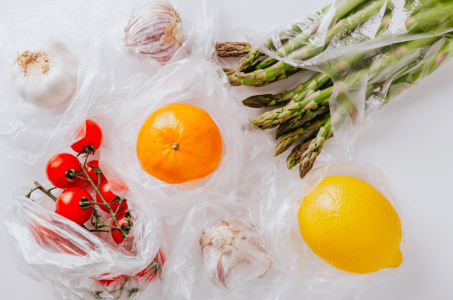
Nutrient degradation
Pre-packaged fruit and vegetables are often exposed to various environmental conditions during transport and storage, which can lead to a loss of some of their nutritional value.
For example, exposure to light can cause the degradation of photosensitive nutrients such as vitamin C and beta-carotene, which are important for maintaining a healthy immune system. Oxygen in the air can also cause oxidation, which can lead to the loss of some of the key nutrients in fruits and vegetables.
Temperature fluctuations, such as storing pre-packaged fruit and vegetables at too high a temperature or exposing them to temperature changes during transport, can also cause a loss of some of the nutrients.
For example, high temperatures can cause the breakdown of enzymes and other nutrients, while rapid temperature changes can cause fruit and vegetables to become damaged and spoil quicker.
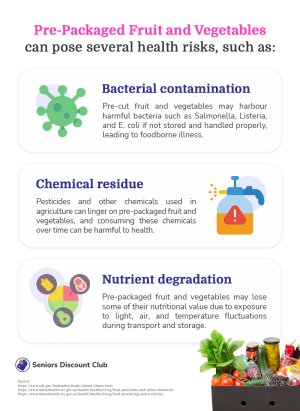
This isn’t the first time a bag of spinach has potentially been contaminated with an unsafe ingredient in Australia.
Just last December, some of the biggest supermarkets in the country - ALDI, Costco, Coles and Woolworths - were caught unknowingly stocking spinach contaminated with a dangerous weed known as thornapple. The contaminated packs were sold in all states and territories, except for Western Australia and Tasmania.
Consuming the contaminated item lead to symptoms such as delirium or confusion, hallucinations, dilated pupils, rapid heartbeat, flushed face, blurred vision, and dry mouth or skin. Yikes!

So, members and fellow grocery shoppers, it's time to take charge and stay vigilant when it comes to our pre-packaged food. Do your research, keep an eye out for recalls, and if you ever come across anything suspicious in your food, don't hesitate to report it.
Have you had any previous run-ins with questionable pre-packaged produce? Share your experiences with us in the comments!
Thankfully, though, there is always the option of online shopping, which allows us to shop for our essentials from the comfort of our homes!
No more fighting for parking spots, no more dragging around a heavy basket, and no more waiting in line at the checkout. Online grocery shopping has changed the game and we're all reaping the benefits.
But, as with anything, there are always a few bumps in the road. Take Louise, a resident of Wanneroo, who recently had a shocker of a story while trying to whip up a healthy salad for dinner.

An Aussie shopper has made a ‘shocking’ discovery in her pre-packaged Coles baby spinach. Credit: Pexels/Rodolfo Quiros.
Louise recently bought a pre-packaged bag of baby spinach, which said 'washed and ready to eat' on the label, from her local Coles supermarket.
However, when she went to grab the greens from her fridge, she realised her salad was going to have a bit of an extra (and rather unwelcome) ingredient in the mix. Hidden among the greens was a dead mouse.
Trodden on and disfigured but unmistakably recognisable (and definitely not part of the advertised ingredients), Louise was immediately (and understandably) grossed out.
'In my mind, I thought I must’ve got one of those mixed leaf lettuce bags with the purple lettuce because it had a little bit of odd colouring,' she said.
'Then I looked closer and saw it had feet and a tail.'
The incident, of course, forced Louise to take the packet back to Coles in person and request a refund – and given the shock of her experience, we don't blame her in the slightest!
At the time of writing, the mouse incident is still being investigated by Coles and the City of Wanneroo, with Louise's complaint believed to have been referred to the Department of Health in Victoria (as the bag of spinach was reportedly packaged there).
It's a horrible thing to have happened, and we can understand Louise's sentiment that it has definitely put her off pre-packaged food.
Members, take this story as a warning sign to always check over your fruit, veg, and other pre-packed items before you use them; it's better to be safe than sorry!
Pre-cut fruit and vegetables are a convenient and popular option for many people, but aside from unwelcome ingredients added to the mix, pre-packaged fruit and vegetables can pose several health risks, such as:

If improperly stored and handled, pre-cut fruit and vegetables can carry harmful bacteria, causing foodborne illness. Credit: Pexels/Edward Jenner.
Bacterial contamination
The moist environment created by the cut fruit and vegetables provides a suitable environment for the growth of harmful bacteria such as Salmonella, Listeria, and E. coli.
These bacteria can cause foodborne illnesses, which can range from mild symptoms such as nausea and diarrhoea to more severe illnesses such as meningitis and even death, particularly in vulnerable populations such as young children, the elderly, and people with weakened immune systems.
To minimise the risk of foodborne illness from pre-cut fruit and vegetables, it's important to take several steps. This includes storing pre-cut fruit and vegetables at the appropriate temperature, avoiding cross-contamination by washing your hands before handling food and using clean cutting boards, and properly storing and using the fruit and vegetables within their recommended shelf life.
It's also important to be mindful of any signs of spoilage or contamination and to discard any fruit and vegetables that look or smell off.

Pre-packaged fruit and vegetables may include pesticides and other chemicals, which can be dangerous if consumed over time. Credit: Pexels/Laura Arias.
Chemical residue
Pesticides and other chemicals are commonly used in agriculture to protect crops from insects, diseases, and other pests. While these chemicals are necessary to ensure that fruit and vegetables are safe to consume, they can also linger on the produce even after it is harvested, washed, and packaged.
When these pre-packaged fruit and vegetables are consumed, the chemicals can enter the body and over time, their cumulative effects can be harmful to our health.
Studies have shown that exposure to certain pesticides has been linked to a range of health problems, including cancer, developmental problems, and neurological damage. These health risks can be particularly pronounced for children, who are still developing and therefore more vulnerable to the effects of chemical exposure.
To minimise exposure to pesticides and other chemicals in pre-packaged fruit and vegetables, it is recommended to buy organic produce whenever possible.
And don't forget, giving your fruits and veggies a good wash and even peeling them, if possible, can help get rid of any yucky chemicals hanging around on the surface. Want to know how? Check out this helpful article!

Light, air, and temperature variations during shipping and storage may degrade pre-packaged fruit and vegetables. Credit: Pexels/Karolina Grabowska.
Nutrient degradation
Pre-packaged fruit and vegetables are often exposed to various environmental conditions during transport and storage, which can lead to a loss of some of their nutritional value.
For example, exposure to light can cause the degradation of photosensitive nutrients such as vitamin C and beta-carotene, which are important for maintaining a healthy immune system. Oxygen in the air can also cause oxidation, which can lead to the loss of some of the key nutrients in fruits and vegetables.
Temperature fluctuations, such as storing pre-packaged fruit and vegetables at too high a temperature or exposing them to temperature changes during transport, can also cause a loss of some of the nutrients.
For example, high temperatures can cause the breakdown of enzymes and other nutrients, while rapid temperature changes can cause fruit and vegetables to become damaged and spoil quicker.

This isn’t the first time a bag of spinach has potentially been contaminated with an unsafe ingredient in Australia.
Just last December, some of the biggest supermarkets in the country - ALDI, Costco, Coles and Woolworths - were caught unknowingly stocking spinach contaminated with a dangerous weed known as thornapple. The contaminated packs were sold in all states and territories, except for Western Australia and Tasmania.
Consuming the contaminated item lead to symptoms such as delirium or confusion, hallucinations, dilated pupils, rapid heartbeat, flushed face, blurred vision, and dry mouth or skin. Yikes!
Key Takeaways
- A Wanneroo resident made a sickening find in her pre-packaged Coles baby spinach – a mouse.
- Following the shocking find, a Coles spokesperson said they were investigating the incident with their supplier and apologised to the customer.
- The City of Wanneroo referred the issue interstate, as it was packaged in Victoria.
Have you had any previous run-ins with questionable pre-packaged produce? Share your experiences with us in the comments!

